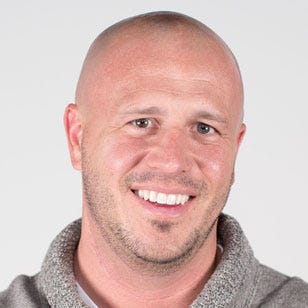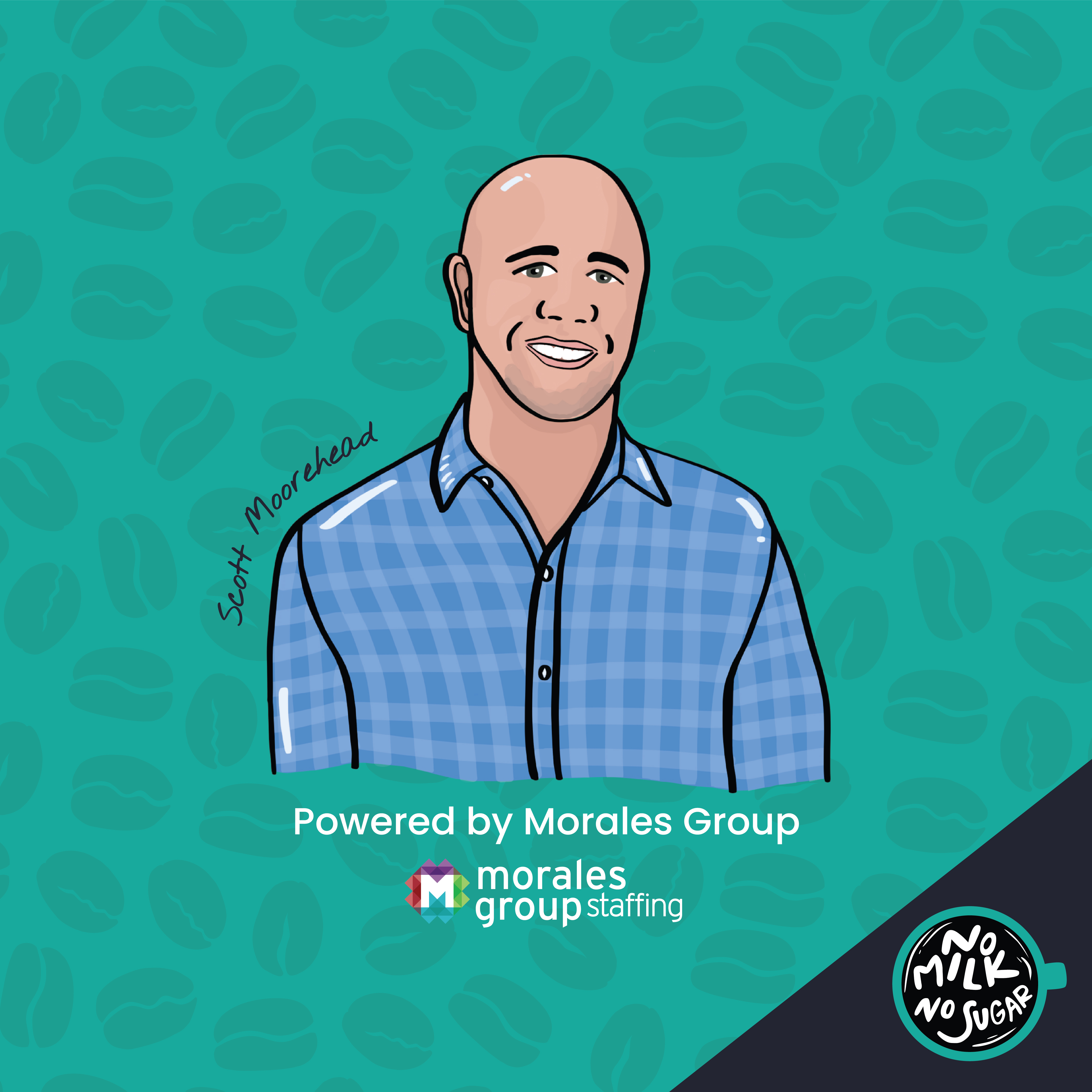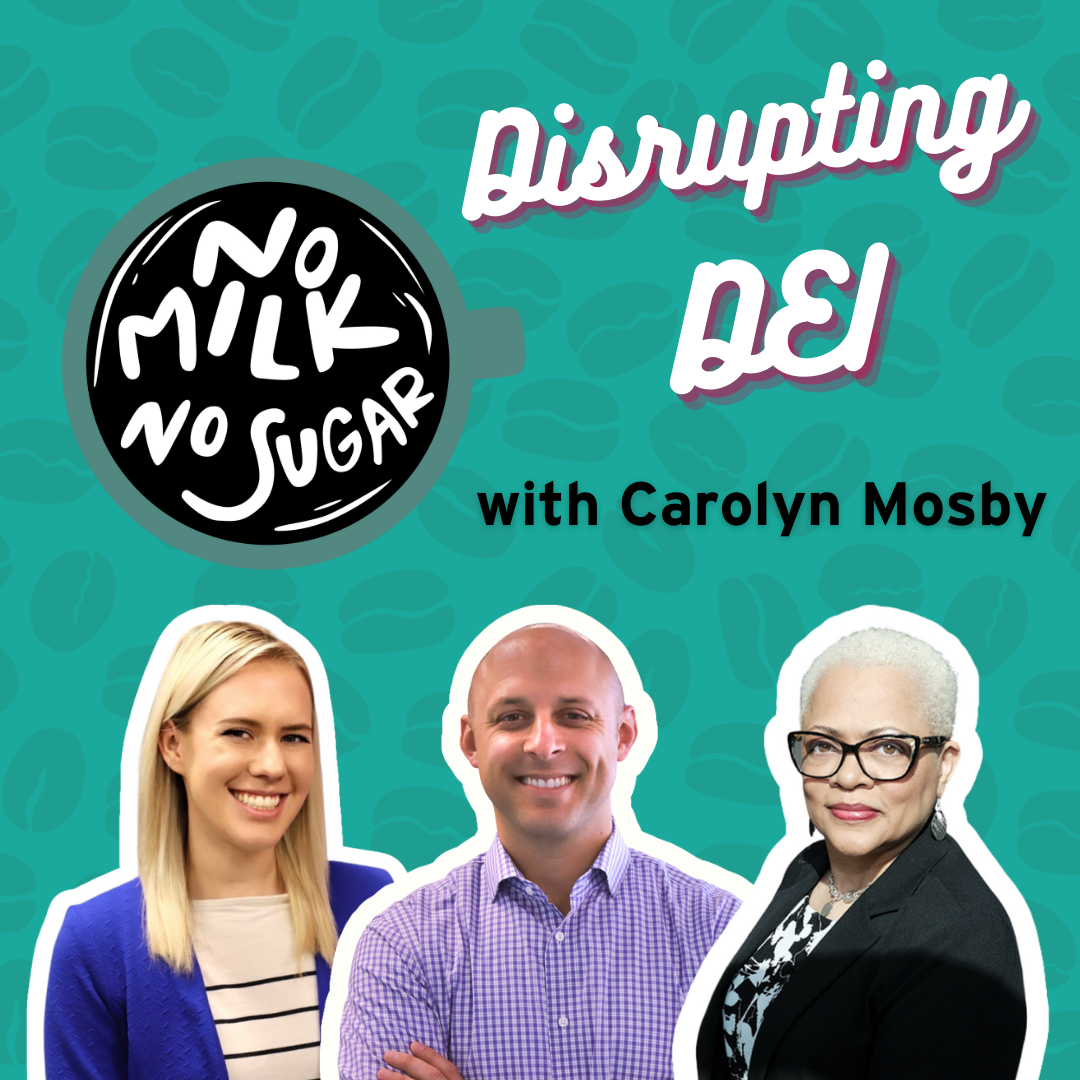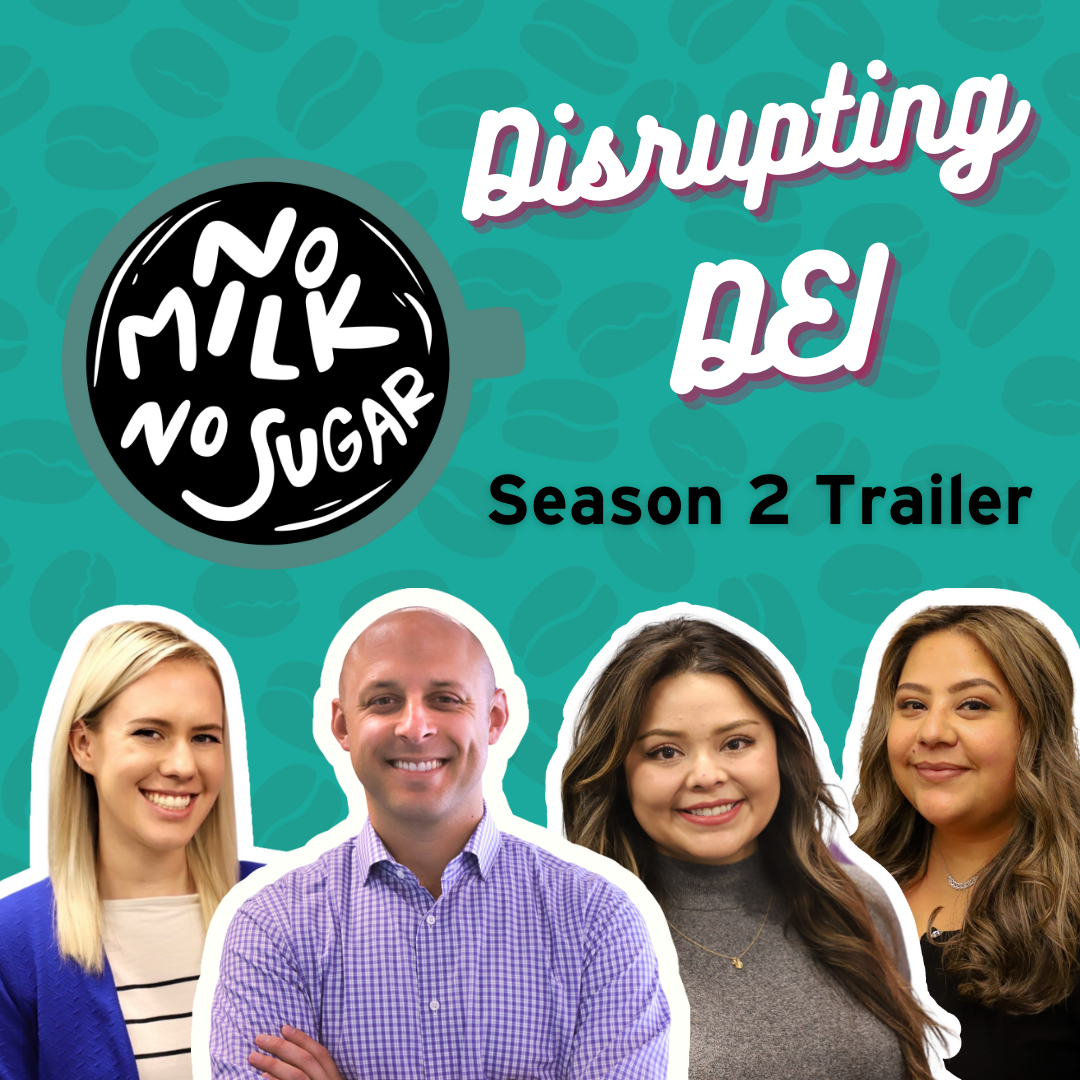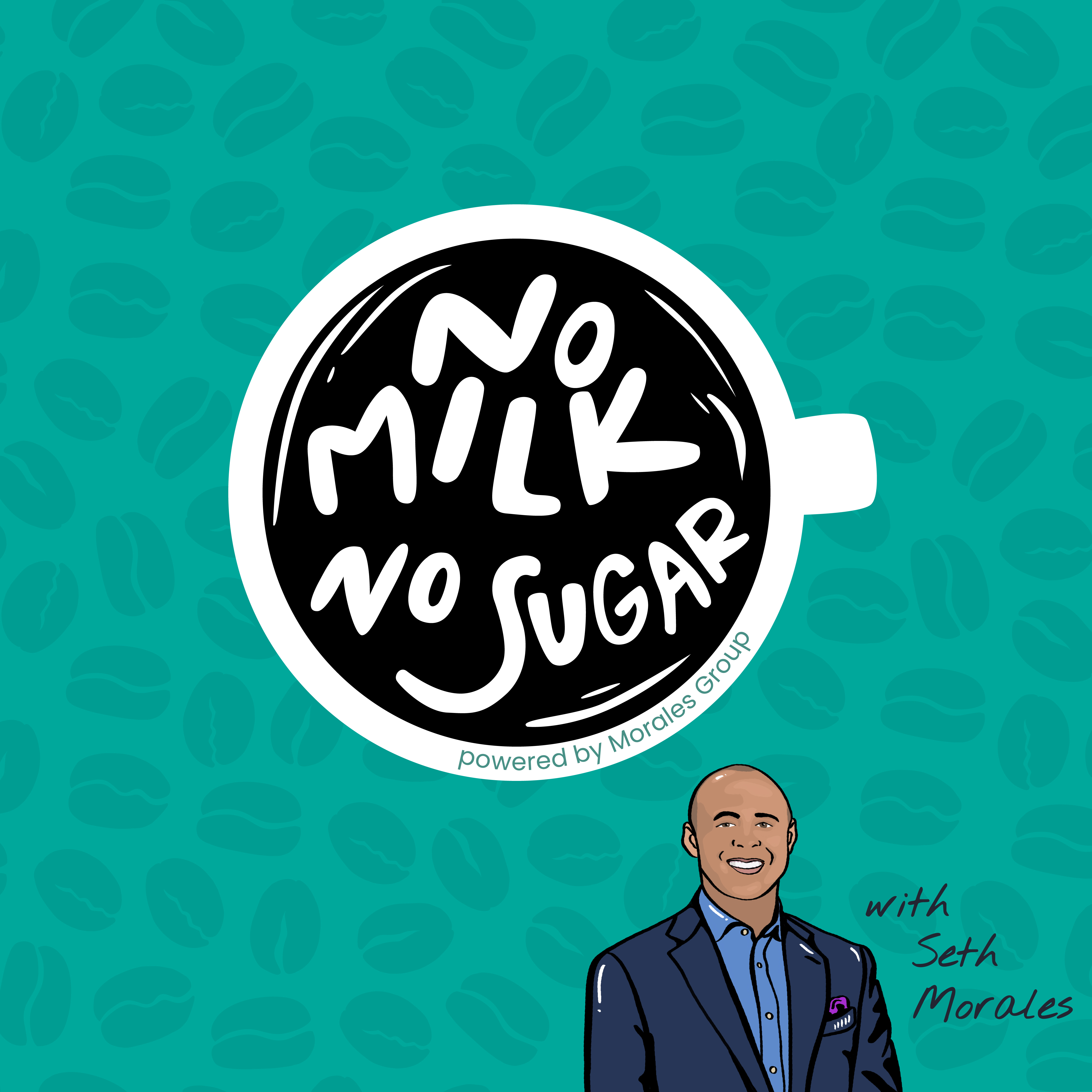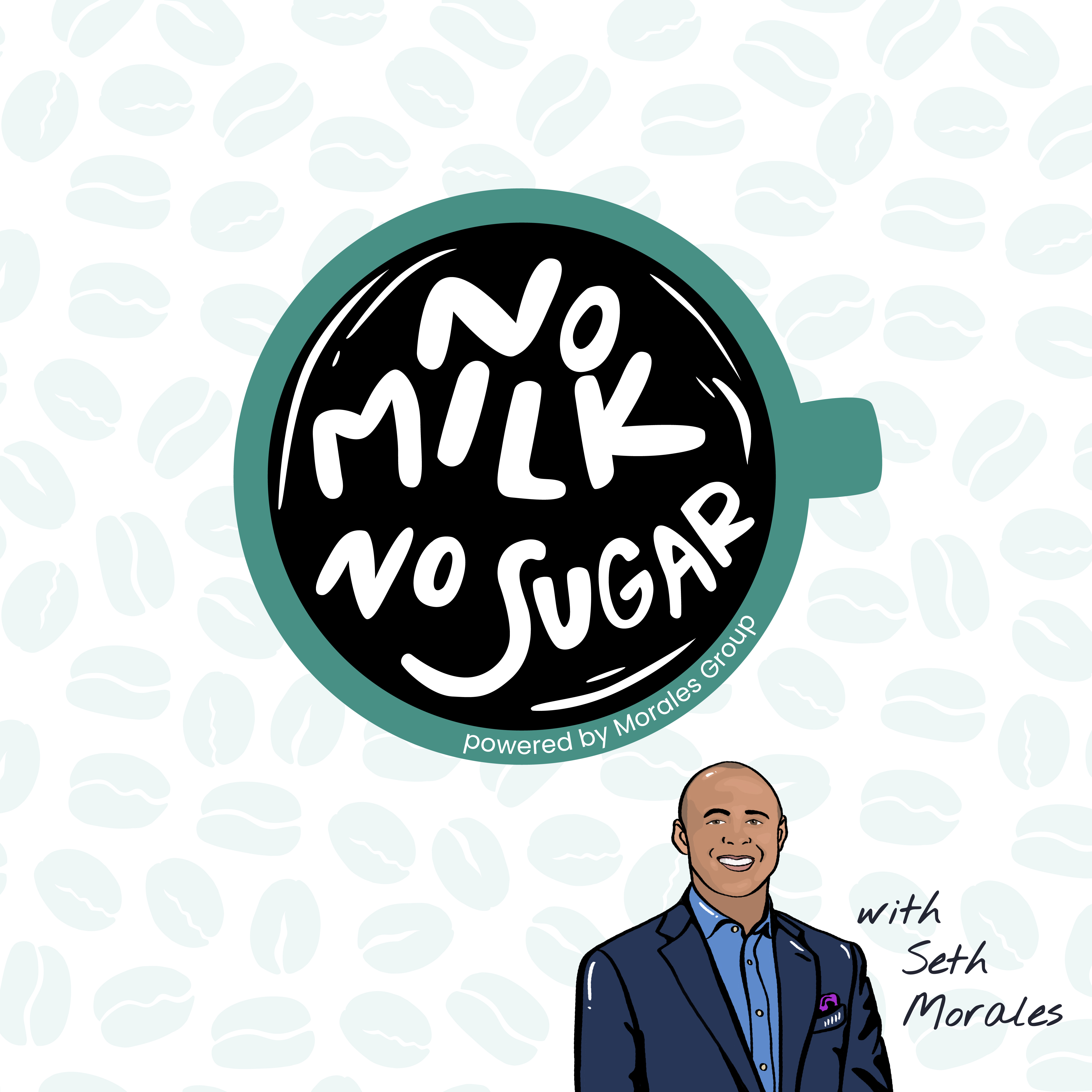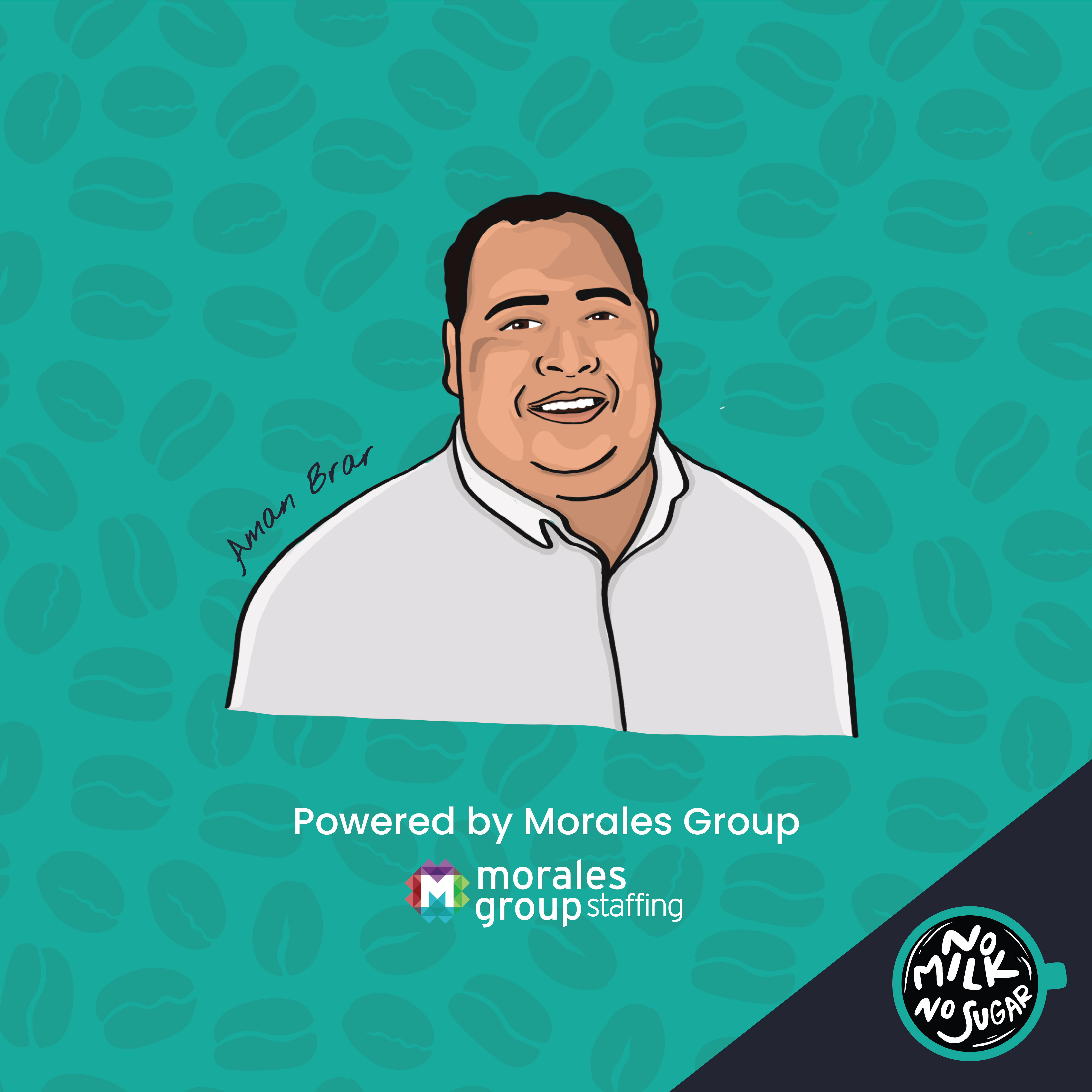The Third Dimension of Business, with Round Room's Scott Moorehead
- 0.5
- 1
- 1.25
- 1.5
- 1.75
- 2
Waitress: I've got a coffee for Seth. No milk, no sugar.
Seth Morales: Right here. Thank you.
Tori: You are listening to No Milk No Sugar. The podcast about business beneath the sweetener. Powered by Morales group and hosted by CEO Seth Morales, we talk to local movers and shakers about what can be the harsh reality of doing business. We cover what no one likes to advertise, but everyone wants to hear I'm Tori, producer of the show. And today we talk to Scott Moorehead, CEO, and President of Round Room, and fellow Purdue alum about the secret to growth, how to find your own niche as a leader, and the three dimensions of business.
Seth Morales: Hey, man. Thank you for making time. I'm going to, before I jump in, it's good to see your face, man. I kind of have a little bit of a, I don't want to call it a man crush, but man, I'm I'm an admirer from afar, man.
Scott Moorehead: I know. I like seeing your face too. I mean, we have the same haircut, so it's like,
Seth Morales: I know, man, two baldies.
Scott Moorehead: Yeah, you're a better looking me with athletic ability.
Seth Morales: No, man you wear the goatee much better. You got this facial hair that I can't grow out, man. But I'll jump in here, welcome to No Milk No Sugar. This is all about business beneath the sweetener. So we're kind of calling it how we see it. It's less of the highlight film, more of what you screwed up, and just being real about that.
Scott Moorehead: Yes, sir.
Seth Morales: For those of you who don't know Scott, Scott Moorehead is the CEO of The Cellular Connection and also just a grand, big company that he's helped scaled up over the last several years. What I thought, we could jump into some fun questions, man, and just get it kind of straight from the hip man, shoot it straight man. Tell us what's going on. But first question I wanted to ask you, I thought this would be fun. If we walked outside to go grab lunch and we got in your car, what would you be listening to in the car, what kind of music?
Scott Moorehead: Good question. I wonder where he got that. So, I just dropped my kids off from school this morning, came directly here. I listen to different stuff when my kids are in the car. I have a soft spot for what they want to listen to. They like the hits one. I know it's not really my thing. I can tolerate it. The second they're out of the car, I'm moving straight to either Phish, radio or Grateful Dead radio. So, it's a little bit of free spirit. I call it organized chaos, which is pretty much how I live my life.
Seth Morales: I think that's a great way to describe just how you roll, man. You built something massive. And we've also, I think when you think about the Dead, Phish,, and just the way they jam out seems like it kind of goes well with your personality. So I threw that question out. So Scott is, he's famous for throwing that out in interviews. What kind of music are you listening to in your car? Because it shares a lot about who the person is, right? So you use that often, or is that kind of tired and you've gotten to something else?
Scott Moorehead: It's never tiring to me. I've done a lot of interviews recently, we've launched another business. And I'm in the dirt, in the day to day, and I've been hiring a lot of people and I still use it and it still tells me what's in people's soul. I've gotten some of the best answers possible. I had a guy say, you know what, silence when I'm in the car. And there's a lot of questions you can't ask as an employer, right? And so the guy, he immediately goes into why silence is okay. Cause it seems very odd. He's like Scott, oh my God, I got this wife that never ends. And she talks for days and I got five kids, a sixth on the way, and it's just constant noise. And so it's the only place I find peace and he goes on and on and on about his family and his wife and his relationship. And you get to know so much more about people when they start talking off the cuff and they stop telling you what you want to hear. And so it's been a fun question for me because it's sort of this total equalizer. Gives me a lot of insight.
Seth Morales: You kind of cut through the bullshit and get to, all right, this is the psychology behind the facade. I like it, man. And it's an interview question that really, I think gives you who that individual is. Love it, man.
Scott Moorehead: And people get excited about answering it. They're like, oh, there's no wrong answer to this one. I got it. I get to come with me. I get to finally be me out of this whole hour. I get to be me, in this moment.
Seth Morales: That's a really good point, man. You've built a pretty massive business over the last several years, and you've interviewed and hired a ton of talented people to help you grow your guys' company. Talk to me. So, family owned business at one point, you took over and you worked in the business, you wore a lot of different hats early on, and then you scaled it up. You really, you kind of threw some rocket fuel on the company and took it from a hundred million to plus 2 billion. Not too many people have done that. I feel like we're kind of rare air. You don't talk to too many people that have the gumption or the ability to do that. But, we're talking about, not so much the highlight film, but, what were maybe some mistakes you made along the way as you scaled up? I'm sure there's a few. You and I have had some one- on- one conversations, but what would stick out to you?
Scott Moorehead: Here we go. What mistakes? I like to phrase it in a very interesting way. But I feel like along the way, between the time that I took over from my folks, which would have been around 2008, and now, so in the last 13 years, I've broken my company three times. And I knew it was broke. The mistake was knowing too late. I was dead set on growing the company. We had this system, as you know, the listeners may not. We have wireless retail stores all over the country, we have a little north of 1200 of them across 43 states, I believe. And we had gotten this system really down where we could repeat this and organically grow. And we were going out and finding new locations, and hiring people, and getting them trained. And it was this whole wash, rinse, repeat, wash, rinse, repeat. And the people on the growth team were having an awful lot of fun. And it was the people that were on the support team that had to clean up the mess, that they finally came up for air and said, I can't do it anymore, you're growing too fast, we have no help, we need better software, we need better procedure, we need more people, we need more talent, and you need to chill out, basically. All that was fine and dandy, to stop and sort of collect ourselves and fix the infrastructure that we had to support the growth. And we'd beef things up and then we'd go out and grow. And that would have been great if I didn't do it again. And I did it again. And then I did it again, and I broke it three times for different, different reasons subtly. But the gist was, I had my eye on growth and didn't really take care of the people that helped us get there. And that was disheartening. And I've vowed to never break my company again. So I'm going to do my best, not to break things. But it, it was broke. And when people look at you in the eye and they have to come up for air and say, Hey, I can't really accomplish the things you want me to accomplish. That's not people's nature. Particularly when you're in a fun environment, where you're succeeding and you're achieving, and you're creating jobs, it's not, people's nature to come to you and say, Scott, I'm failing. You know, they just want to succeed and they want you to succeed. And they want to be on the train and they want to be part of the team. And so that's why it was too late. They didn't have the forethought to say, this is headed for imminent demise if we don't get some help. They just put in more effort, and they put in more hours, and then sooner or later they break. And when they break the whole company breaks. So that was a tough one for me. And I'll never forget it. Cause I can remember what I was doing the day that I found out that I broke my own company.
Seth Morales: When you say break, and you say you outgrew and people didn't raise their hand, you lost some good people along the way? Give me an example of what that would look like. That would be somebody that was a key strategic leader that maybe didn't raise their hand, felt like they were disappointing you.
Scott Moorehead: No, it was more of the people that were on the frontline. On the frontline, in the terms of back office support. We had a lot of manual processes in the beginning. My folks were not retail people in their world. My dad was an electrical engineer and ran an electrical contracting business, and my mom was an English literature major and they somehow ran a retail business. And so we didn't have third- party logistics. We didn't have a POS system. We did everything by paper and trust and they treated everybody like family. And it worked for a long, long time until you get seven states over and people stopped caring about who the family is, and they don't see us every day. And so, in the process of trying to change everything, it just couldn't change fast enough to keep up. There was a lot of paper process, a lot of manual process. And it's those people that are opening envelopes, and sorting things, and doing manual entry into the accounting system. They're looking at me like, I'm working as fast as I can. I'm working overtime. I'm not seeing my kids at night, the way that I was promised. And the paperwork is piling up at a rate that I can't keep up. And that's the disappointment. It wasn't as much the key strategic people, as much as it was those people that I had promised them balance in their life. They had become unbalanced.
Seth Morales: That's a good point, man. You've got good awareness. You've got empathy as a leader. I know you have a healthy culture inside the organization that you've built, but that, being aware of and feeling, Hey, I broke the company. I feel bad about this situation, especially those that are on the frontline. And it's good that you, there's a lot of leaders that could give two shits about that. So you being that empathetic and at least being aware of it. Because you've talked to me a few times. You're like, man, I broke my company a few times and I was like, what does that mean? What's he talking about breaking company, but I get it. Growth versus back office, and that challenge, it's a difficult balance because man, the growth is like, it's a high, man. We're not at your size, but it's fun to have those successes and high fives. Talk to me, you realized that, obviously you promise, you're vowing not to do that again. I hear you loud and clear, but this success, so this is a little bit more like highlight film. You've had success. You said something about your secret to growth. You talked about this like Venn diagram, having a few things that kind of overlap and really kind of make you guys special. It's your secret sauce. Talk to me about kind of the secret to growth and that Venn diagram for those leaders that are trying to scale up their business. You put people and engagement, just layer those things in the right way. Can you share a little bit more about that?
Scott Moorehead: There's a lot of variables when it comes to growth. People are excited about it. They like to be on a company that's high growth, that's going fun places, but they also want to know that when this thing slows down, that I'm really going to like my job. And that was something that we focused on big time, was let's find a way to authentically give people a passion when they're not doing something that they're necessarily passionate about. I don't think anybody wakes up in the morning and they're like, you know what? Like I just so desperately want to be in accounts payable the rest of my life. And I get a lot of fulfillment out of making sure all the bills are paid. It's a skill that people have and every company needs that. But how do you intertwine that and give them a sense of fulfillment beyond just making sure that things are paid on time and accurately. And I'm just using accounts payable as an example. We wanted to give people a reason to care about the place they worked for. And so we were very intentional where we wanted people to care and we wanted to act as a family. And we made sure that we did that, we did a lot of fun things, but we also wanted to stress that the business is the business, and if we don't make money, then we can't be around. So it's equal parts work and play. This Venn diagram comes in where your employees and your community and your customer kind of has to touch. And so there's a sweet spot in the middle where, if in the sense of a Venn diagram where these convergent circles overlap. And what your community, your customers, and your employees all care about is that authenticity and that soul of your company, where you can really have this magnetic draw to the middle, where everybody has a passion. And everybody equally cares about it. And I believe every company has one and it was this odd epiphany where it's the whole being socially conscious was really starting to come into the forefront. It was emerging and I'm saying, Tom's did it right. You know, they pulled it in and said, okay, we do shoes. So we're going to focus our philanthropy and our efforts around shoes and people who don't have the same shot in life as the people who can spend 60 bucks on these piece of crap shoes. I said, how do we do that in wireless? And we just really focused on the community where we were working. And we allowed everybody in our organization to be able to feel and touch the giving back. We did not centralize it and make it this big giant check where everybody was supposed to be proud of the owner for writing it. We pushed it to the far reaches of our company and said, everybody in our company has the ability to give back. And so we're not just going to make it a project where we go get 20 of us, and we go build a habitat house. It has to make sense. It has to be completely woven into what we do on a day- to- day basis so that everybody knows as they row the boat, we are all rowing towards being able to give back more, and it worked. And once people got a taste of it, they're like, this is so amazing that I can have such a mundane effort here and know that my existence matters completely and utterly. And that was an awesome feeling, to empower people with that. Because even on the bad days, they're just reminded, this place is pretty special because everything that I do helps somebody, and it doesn't just help the owner put more money in his pocket, which is always a battle, right? I'm sick of making somebody else money. Well, when you can shift that and say, okay, every effort that you do helps somebody that needs it, then all of a sudden it's a different conversation. And that's been the driver of our culture for about the past eight or nine years. And our turnover has been, statistically speaking, compared to our peers in our industry, running at about 50% of what their turnover does. And in an industry where turnover is inevitable, we've had an incredible amount of loyalty. An incredible amount of loyalty. And those people are more productive, they're happier, and we've had next to no turnover at our corporate office. And nobody felt like they've been broken, which is also a good thing.
Seth Morales: That helps too, man. No, that's great. I appreciate you sharing that. I think the individual on AP, accounts payable feels like there's purpose. They can get behind your mission and it's not necessarily about how much more can we put into Scott's pocket.
Scott Moorehead: Everybody wants, everybody wants a KPI. They want to be graded. They want to know where they're at, but they also want to know where they're headed. And sharing that why, that became that nucleus. And it was that magnet in the center that sort of held us together, like glue
Seth Morales: I was going to say, talking about kind of going forward. You talked about some new endeavors.
Scott Moorehead: The one thing that I did over the past couple of years, I was very intentional about making a move with myself. I wanted to be a CEO and not as much as part of the day- to- day, because I felt like I was in the way. And so I created an organizational structure and a team that took over and freed up my time to go do some other things. And that was a humbling experience. I've really only ever worked at one company, and I've put so much effort and blood, sweat, and tears is the fun saying to say, but put a lot of my identity into what this place has become. And having to step out of the day- to- day is kind of like your kids leaving the house. You're left with an empty house and you're like, okay, they don't need me anymore. Andy you're like, what do I do now? And it's this awful empty feeling. And finding that balance of making sure that they're still doing the business the way they should, and not necessarily overstepping when I disagree with what they do, finding that balance has been hard. The new business that we pointed our direction in. So my wife and I are both in the business, which is a whole nother topic we can get to some other day, which is how to work with your wife. We took careful inventory of what we thought we were good at, and the list was short. But then we figured out where do we point ourselves? And where are we going to find some success? Where's an industry that we can really get behind and it led us to the cannabis industry. And so we've been launching that business up in Michigan where the laws are much different than they are here in Indiana. And we've been having an incredible amount of fun, putting that brand together. Building a completely vertically integrated business in the cannabis space and really replicating everything that we knew that worked at Round Room TCC and putting it in place from day one. Been really a fun endeavor to start something from scratch and have the knowledge from what we have built on the wireless side and apply it to a completely new industry. And do things with a level of professionalism that a lot of businesses in that space just don't have.
Seth Morales: You've got the culture piece. You've got the people part. I love that you guys really kind of latched onto the franchise model kind of later with TCC and really scaled it up that way. You understand how to operate and run a business. You've scaled it up, right. You get the systems and process and the retail side, whether it's cellular or cannabis, there's some commonalities there, man.
Scott Moorehead: It's a widget, right? And I think everybody learns how to run a company that makes widgets in business school, right? We've all learned. I think at Purdue when I was there, that the common thing that we used to build businesses around was a rubber duck factory, for some reason. That was always the example they gave in business school. I'm like, okay, fine. Point is a widget is a widget is a widget. And a supply chain is a supply chain. And a point of sale system is a point of sale system. What you call your skews and what you sell and the pricing and the economics, it's all, it's all very similar. So we were able to find an industry that was in its infancy and get in early. And it was in this weird gray area where we were willing to lean in when the state laws didn't necessarily match the federal laws. And we're still in that space right now. And that has kept a lot of people on the sidelines when we could really take into that industry the heart of an operator that had scaled a big business. And say, let's do this and create our next big ass family.
Seth Morales: Yeah. No, you're going to do it man, 10 years from now, we're going to be at a Purdue basketball game like we were a couple of years ago before COVID hit, and you're going to be talking to me about how you're the cannabis czar of the US, man. And you guys had the operation with TCC and you were the operator that came in to really put rocket fuel and grow it.
Scott Moorehead: Seth, I think at the heart of almost any successful company, you've got to have a successful operator. I mean, money people are great, but the people that only talk about spreadsheets, they're going to eventually falter because business is three- dimensional. A spreadsheet has an X and Y axis, but that Z variable is how you motivate people. How you get them to row in the same direction, how you get them excited about it. And you can't do that on a spreadsheet. Matter of fact, you'll probably fuck that up if you just do it from a spreadsheet, because many times the best financial decision, isn't the most obvious one for the near term. You have to really look out for people and you have these two millimeter shifts along the way that eventually pay off massive dividends, but they aren't immediate. They aren't immediate.
Seth Morales: Hey, talk to me about, you're starting up this new business. Where have you stubbed your toe, where you screwed up? Anything that sticks out and you're like, Hey, I really screwed this one up. Or you guys been clean and no hiccups.
Scott Moorehead: We've been, we've been cleaning up pretty good. It's a fun business to be in. Really, if I'm being really honest. I've had the luxury of just knowing how many mistakes I've made in the past and bringing that to the table. If anything, my inability to talk about the timing and when I think things will drop to the key people that we've hired has been my mistake. Cause I can kind of see into the future six months down the line, we're going to need an IT guy. Well people think we need an IT guy now, because the IT guy is Scott, and Scott's a shitty IT guy. And I'm like, well, we don't need that yet, but I know when we're going to need it. And I know when we're going to need somebody for payroll and it's not going to be the controller. And I know when that's going to split. So I've seen the growth, and I've seen the high growth, and when to not break your company, and how to not break your company. And if anything, the folks that we've brought on on that side are a little bit more eager to add more people to the team and not afraid to say so. And I'm kind of throttling it back saying, I hear you. And I see it. And just pause for a minute. So I'm trying to remind them. Cause most of them came from bigger companies and we're a startup. They just see us at Round Room and TCC, and the fact that we've got hundreds of people all over the place and you can pretty much just holler out into the message boards and say, Hey, I got a deck to put together who wants to help, and find somebody. Well, that somebody for our new company has been like five of us. We're like, there is no help. I'm the IT guy, I'm the accountant, I'm the HR person. Sooner or later, I don't want to be that, but it's all about timing. So that's been my biggest mistake, is just not sharing the timing and the way that I see it, I would say. Because I've been really fortunate to bring the things that I've learned in other industries to this one.
Seth Morales: Scott, I love that you've taken shots. Like you've taken big shots and you've missed and you've been real about it. I think that's what's attractive about you, man. You're, like you said with the bankers, you're real. And I think what you see is what you get with Scott Moorehead. I mean, when I was having a beer with you, man, I just felt like, here I'm having a beer with a guy that runs a$ 2 billion organization and it's probably the easiest conversation I'll have with anyone else. It's just natural to chop it up with you, man. So I think that's a blessing and maybe it's a little bit of a curse that you're not afraid, but man, I think if you don't take enough shots, how are you going to get confident, man? So, I don't know. I appreciate you sharing that.
Scott Moorehead: There was a saying, and it was, I wish I could take credit for it cause it's great, but I heard it from another speaker, and I can't remember where. But they said that the most successful people are the people that are the same person as they are when they're with their best friend on their best day, while not drinking. It was like, if you could be that person all the time in every situation. When you're with your best friend and you're having an amazing day and you're not drinking, all your guard is down. You have incredible confidence, trust, you have a positive outlook, all the things that people want. And it's sort of encompassing of the attitude that really gets people far. Attitude is so much of the game. I had multiple meetings with the CEO of Verizon Wireless, who's, obviously they're one of the 20 largest companies on the planet and it's the same Scott that meets with that person that meets with the accounts payable department here in Carmel. Be that same person, wear that same face, be your own special kind of weird. And I think when leaders do that, it encourages everybody on the team to do that. And that's really important. That's really important.
Seth Morales: That's gold, man. I appreciate you sharing that. That's a Moorehead nugget that I'm going to tuck away. That's something that I think a lot of leaders struggle with that, man, just trying to wear different hats at different times, man.
Scott Moorehead: I have another story about tough times. I went through a phase as my role was growing as the CEO and President where the company was bigger and I thought we needed to be more professional. And I had chosen a few different people in my life to emulate, and they were CEOs of big companies that were successful. And I really thought if I just be like successful people, then I'm going to be really successful. So I started to bring on traits of what they did, and part of what they did was just make decisions really fast. And they were very confident. They just made the decision, move forward, very elegant and the way that they answered things. And I'm not that person, I'm a thinker. I like to really wrap my head around ideas, ask questions. When I'm at my best, it's when I've completely vetted this thing out and I'm completely confident in it. And I went through a spell where my key leaders in the company, I was giving sharp answers to and I thought I was giving them what they needed. They needed a leader that was resolute. They needed somebody that was ready to make decisions, move forward confident. And all I was, was a dick, and I found out later through a coach of mine who had earned the trust of the team, that there were days where Scott was in a good mood and it was probably time to go pitch your idea, and there was days where Scott was in a bad mood and you didn't need to really visit my corner of the building. And I was like, shit. And it wasn't that I was in a good mood or a bad mood. It was just that I was giving feedback in this manner that people didn't like. And I fell back on some of those things that we just talked about before. I'm trying to be somebody that I think I need to be and not who I am. And it was only when I really decided to be exactly who I was and that I am, that I was at my best. And my best is different than those people that I was trying to emulate. And, we're all going to get to the same place. We're all going to get there a different way and that's okay. So take what's best of what you see and make it inherently you. And if you get the opportunity to be uniquely you, that is when you will succeed the most. And so I learned that the hard way by finding out that my team thought I was a douche, and that stung. And I had to throw my tail between my legs and apologize and tell him that I was going to do things differently. My coach said for the next month, I need you to look people in the face, say, thank you for sharing your idea with me. I would like to think about it overnight and I'll get back to you tomorrow. And I don't know how many times I said that he was like, I don't care if they ask to change the toilet paper and you have a hard opinion on that, you're going to think about it overnight. And I was like, okay. And I did that. And all of a sudden, you know, people started coming into my office more often. And I was like, I think he fixed me. And I was thankful for that.
Seth Morales: Well, I appreciate you sharing today, man. Lots of gems to unpack. Really proud of all the stuff you're doing, excited to see what you do with your new endeavor. And I know you're not done with TCC and Round Room and how you're going to continue to grow that. So just keep growing, man. I'll be taking notes from afar and cheering you on.
Scott Moorehead: If I can help one person not step in the same landmines that I did, I feel like that's a successful day.
Tori: But it was a really great quote. He said, I decided to be who I was, and that's when I was at my best. My best is different than those I was trying to emulate, which I think is a great throwback to our episode with Meredith. Bronk actually,
Seth Morales: I mean, I think he's just so real.
Tori: I really liked his kind of take on how business is three- dimensional. It's not just your X and your Y, but that Z factor is how you motivate people.
Seth Morales: Yes. A few of the things that really stuck out to me was just, he said he, every three or four years, he'll spend$ 7 million and kind of screw up. And he's not afraid to take those calculated risks, but they've been growing pains and learning moments, but he continues to not be fearful, but he also learns along the way.
Tori: Thanks for tuning into another episode of No Milk No Sugar, the podcast about business beneath the sweetener. We hope you learned something, and we'd love to hear from you tag us with# NoMilkNoSugar, or email us at NoMilkNoSugarPod @ gmail. com, or connect with Seth on LinkedIn. Subscribe wherever you get your podcasts, and we'll see you next time.
DESCRIPTION
In this episode, Seth talks shop with Scott Moorehead, CEO and President of Round Room and TCC, and fellow Purdue alum about the secret to growth, how to find your own niche as a leader, and the three dimensions of business.
Today's Host
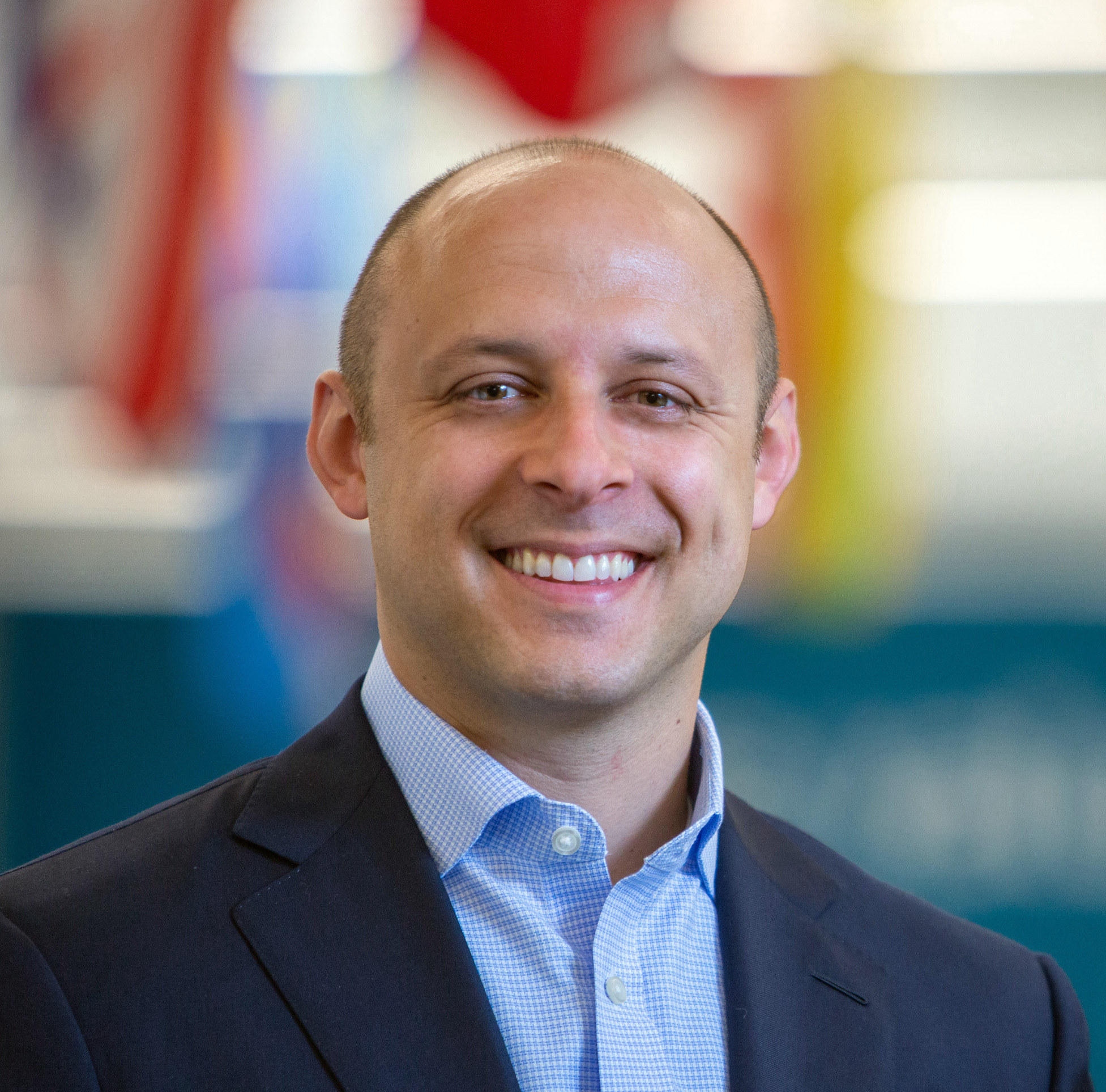
Seth Morales
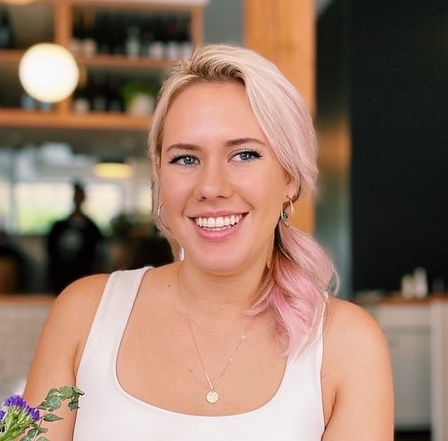
Tori Updike
Today's Guests
